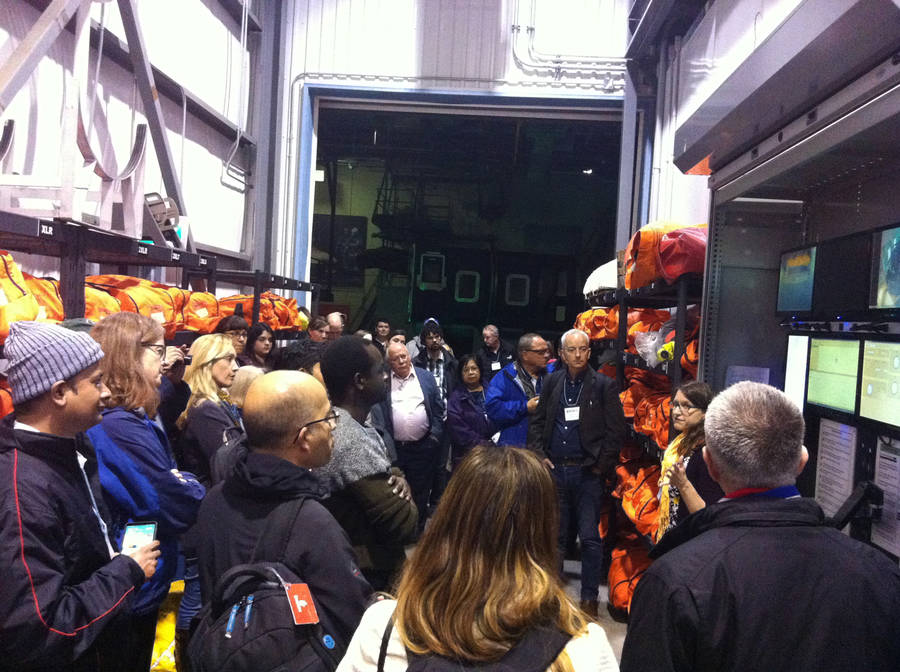Every fisherman deserves to come home safely at the end of a trip. The National Institute for Occupational Safety and Health has been working for decades not only to track injuries in the U.S. commercial fishing fleet, but also to research and develop targeted safety solutions for specific regions and gear types in cooperation with the fishing industry. Although there has been a decrease in the number of fatalities and vessel disasters in the United States over the last few decades, even one life lost or one career ended is still too many.
This is why NIOSH’s Center for Maritime Safety and Health Studies gathered a group together to organize the fifth International Fishing Industry Safety and Health Conference (IFISH 5).
In June 2018, more than 175 occupational safety and health researchers, safety professionals, industry members and students from 24 countries gathered in St. John’s, Newfoundland, with the goal of improving safety and health in the commercial fishing industry through research, innovation, and the exchange of ideas. That’s double the size and programing of any previous IFISH conference.
One of the recurring themes throughout the conference was that fishermen, while an independent bunch, make safety a priority. They desire solutions that are relevant and practical to their work. What we’ve learned is that the best research, solutions and policies come from listening to fishermen — identify what saves them money, what makes work more efficient, and what makes sense for their specific fleet.
Understanding what fishermen think about, talk about and worry about, and then developing new techniques and technology based on that understanding is how we reduce risk and improve safety. Partnering with fishermen to hear their ideas and develop and evaluate solutions leads to better results and ultimately a safer workplace.
IFISH 5 attendees participated in four days of workshops, presentations, discussion panels and other activities. Topics included injury and illness statistics, innovations in technology and evaluation of policy, and best practices to reduce safety risks, improve training and safety culture. IFISH 5 also expanded its program to cover occupational safety and health issues in seafood processing and aquaculture, since these maritime industries share many of the same hazards, injuries and health outcomes as commercial fishing. A complete list of presentations and abstracts can be found on the conference website ifishconference.ca.
Just as many hands makes the work light, many minds generate new ideas, and IFISH 5 was no exception. In the months since the conference, there have been several positive outcomes, in addition to many contacts and opportunities created by the conference. One organization is working to create an electronic forum for researchers studying personal flotation device use and design for fishermen. Researchers from all over the Arctic have formed a network focused on addressing the unique safety and health issues of the Arctic maritime industry. Another team of researchers has formed a group to create a report on preventing respiratory disease resulting from seafood bioaerosol exposures, and another was created to exchange information about health and safety issues in the aquaculture industry. The conference organizers are currently working with a scientific journal to publish a special issue containing research papers presented at IFISH to share this knowledge to a broader audience.
NIOSH co-sponsored IFISH 5 with Memorial University of Newfoundland and the Food and Agriculture Organization of the United Nations. Other sponsors included New England’s own Fishing Partnership Support Services, the Ocean Frontier Institute of Canada, and WorkplaceNL (the regional government agency responsible for workers’ compensation in Newfoundland). We thank these organizations because together they helped defray the cost of the conference, provided travel scholarships for 14 presenters from developing nations, organized workshops, and sponsored networking events—all resulting in a much richer experience.
We’d also like to acknowledge and thank the U.S. fishermen and fishing industry safety professionals who attended IFISH 5. Sharing your experiences and highlighting your dedication to safety and health in the industry greatly contributed to the overall success of the conference.
Because there was such an overwhelmingly positive response to IFISH 5, NIOSH is already looking for partners and exploring location ideas for IFISH 6 in 2021. In the meantime, researchers are looking to hear industry’s ideas, and establish partnerships to continue to make fishing safer and healthier. If you’d like to know more about IFISH or are interested in collaborating, please contact the NIOSH Center for Maritime Safety and Health Studies at CMSHS@cdc.gov.







